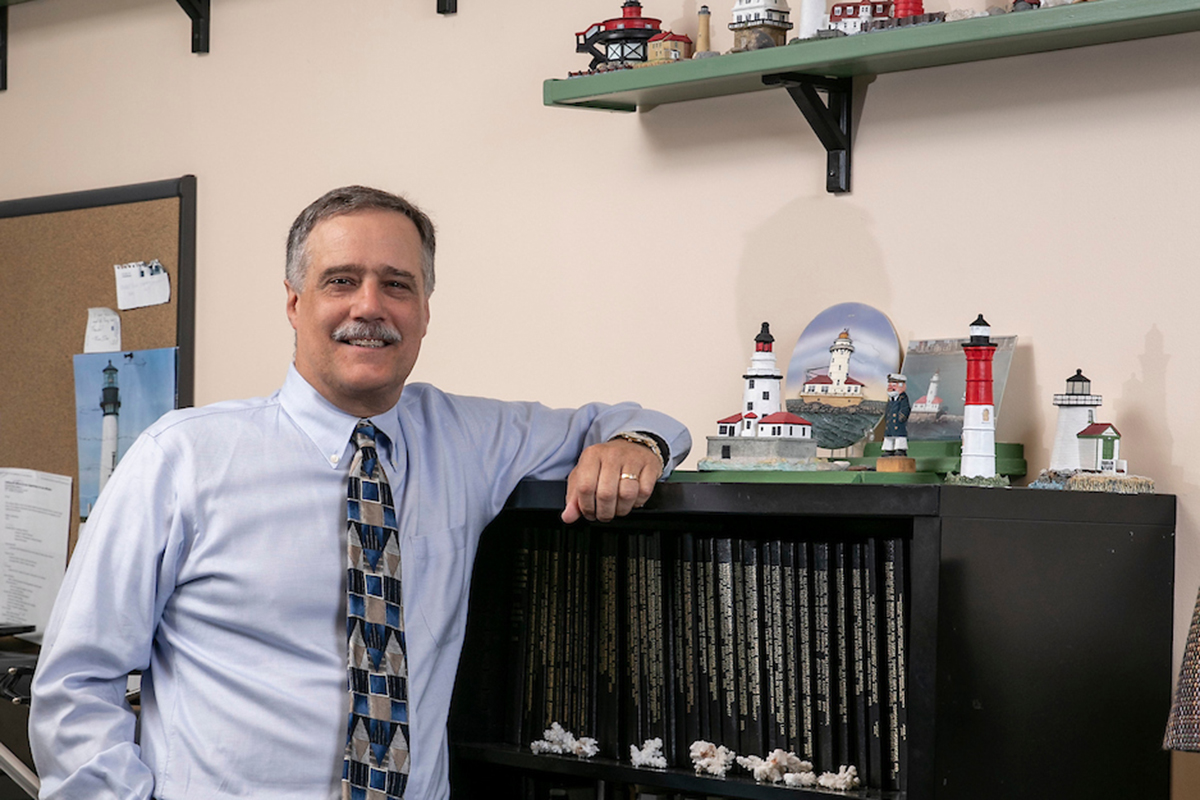 Joseph Ferrari, a professor of psychology, has spent his career researching procrastination. In recent research, Ferrari and his co-authors connected clutter with procrastination for the first time. (DePaul University/Jeff Carrion)It’s hard to imagine piles of clutter strewn about researcher Joseph Ferrari’s house or office. The professor of psychology knows the risks associated with that after spending much of his career studying and publishing on the topic of procrastination. Now in new research, Ferrari has discovered that an overabundance of “stuff” can have a detrimental effect on a person’s mental health and disrupt their sense of home.
Joseph Ferrari, a professor of psychology, has spent his career researching procrastination. In recent research, Ferrari and his co-authors connected clutter with procrastination for the first time. (DePaul University/Jeff Carrion)It’s hard to imagine piles of clutter strewn about researcher Joseph Ferrari’s house or office. The professor of psychology knows the risks associated with that after spending much of his career studying and publishing on the topic of procrastination. Now in new research, Ferrari has discovered that an overabundance of “stuff” can have a detrimental effect on a person’s mental health and disrupt their sense of home.
According to findings recently published in the journal Current Psychology, Ferrari and co-authors — that included DePaul graduate students Kendall Crum and Matthew Pardo — investigated the connection between procrastination and clutter and discovered that chronic procrastination can lead to problems with clutter in the home.
Ferrari, the author of the 2010 popular consumer book “Still Procrastinating: The No Regrets Guide to Getting It Done,” has studied procrastination since the late 1980s. His previous research determined that procrastination has many causes and consequences and that it’s different from delay, pausing, waiting, pondering or prioritizing.
In this Q&A, Ferrari discusses the link between clutter and procrastination, explains chronic procrastination, and describes several myths of procrastination.
In a series of recent studies, you led a team of researchers who looked at procrastination and clutter. What did the research uncover?
I think it’s important to first define both. Procrastination is a tendency to delay the start or completion of a desired task to the point of experiencing discomfort. It leads to dysfunctional ways of being, and consequently, a reduced quality of life. Procrastination is not the same thing as waiting, postponing or delaying. In general, delaying is not a problem, waiting is not a problem, when we do those things we are often gathering information. To procrastinate is to avoid something strategically and purposefully. Clutter is an overabundance of possessions that create chaotic and disorderly living spaces. It’s not the same thing as hoarding, it’s broader than that. It’s not a psychological disorder like hoarding is, at least not yet.
In our research, the findings suggest that a general propensity to procrastinate when it comes to attending to routine, everyday tasks, such as sorting and disposing of personal inventory items, can lead to problems with clutter. Procrastinators reported excessive clutter and that their overabundance of possessions negatively affected their identity. The more clutter you have, the more likely you are to be a procrastinator. Which makes sense, because you’re unsure of what to get rid of.
What is chronic procrastination and how does someone know if they have it?
Chronic procrastination is when someone has procrastination tendencies not only in one setting or one task, but throughout their entire life. It's a maladaptive lifestyle. They do it at home, school or work, and in relationships or responsibilities. They are always delaying, it's very frequent. Procrastinators are tremendously great excuse makers. They always have a reason. They never take the responsibility on themselves. It's why working on time management doesn't provide relief for procrastinators. They will have their ready excuse. It's never their fault.
Everybody procrastinates, but not everyone is a procrastinator. If you are a chronic procrastinator — 20 percent of people are and many are seeking help — cognitive behavioral therapy may help you learn how to change the way you think and the way you act.
What’s your advice for people who are concerned about clutter and procrastination in their life?
I'm very much interested in the meaning of home. What does home mean to people? In research, I’ve found that the more the clutter, the lower the sense of satisfaction with home. Extending that to procrastinators, people who are more indecisive hold onto their things because they can't decide what to keep. I would suggest for people to focus on relationships, not relics. Life is not about me, it's about we. It's about us together.
Joseph Ferrari is among the hundreds of DePaul faculty who offer their expertise to members of the news media through the DePaul Experts Guide. Are you a faculty member interested in speaking with the media? Learn more about the guide in Newsline.